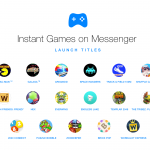Facebook introduces Group Video Chat in Messenger

Facebook has been adding all sorts of features to its chat app recently, including classic arcade games, and a new camera with art and 3D effects.
Today, the social networking giant introduces the ability to video chat in groups, which it describes as the most requested Messenger feature ever.
Facebook reveals what it is doing to tackle fake news

The issue of fake news has been in the headlines a lot recently, and it is Facebook that has borne the brunt of criticism. The social network is in the throes of revamping news feeds in a bid to help stamp out the problem. But Facebook is aware that fake news is not going to be eliminated overnight, and so is focusing on "the worst of the worst".
Today, the company sheds a little light on the work it has undertaken, and what is still being done to help stem the flow of fakery. The initial targets are "the clear hoaxes spread by spammers for their own gain", but this is just the beginning.
Facebook Messenger gains a powerful new camera with art and 3D effects

Facebook Messenger doesn’t just let you chat with friends, you can also use it to play games.
Today, the chat app introduces a faster, and easier to use camera that will let you spice up your conversations, and capture and share moments as they happen. There’s more to it than just that, though.
Twitter apes Facebook and brings live video streaming to its mobile apps

Twitter is rolling out a new feature to iOS and Android users that enables users to broadcast live video from within the app. If this sounds rather familiar, it's because it's a feature copied from Facebook -- and something that is already offered by Twitter-owned Periscope.
But live video broadcasting on Twitter is not replacing Periscope, it is powered by Periscope. By moving live video direct into the app, Twitter acknowledges the importance that users place on the feature, something which has been proven by the popularity of Facebook Live videos.
Facebook launches Parents Portal to help keep kids safe online

Facebook is on something of a mission to clean up its act, or at least its image, at the moment. The social network is looking to tackle the problems of trolls, bullying and fake news, and its latest campaign is a bid to keep younger users safe.
The minimum age for using Facebook is 13, but this still means that there are some young, naïve and impressionable users out there. With its newly launched Parents Portal, Facebook is looking to arm parents with the information they need to educate their kids about staying safe.
Facebook reveals the biggest trending topics and Live videos of 2016

We're nearing the end of the year, so expect to be inundated with retrospectives for 2016 -- Facebook has just released its look back at the year that's (nearly) gone by.
The social network's review of 2016 comprises two top 10 lists: the most popular trending topics of the year, and the most popular Live videos of the year. It should come as no surprise that the trending topics list is dominated by major political events such as the US election and Brexit, as well as celebrity deaths.
Facebook granted European license for electronic payments in Messenger

Payments through Facebook Messenger have been available in the US for some time now, and they're about to make their way to Europe.
Facebook has just been granted a license for 'payment services' and 'e-money issuance' with the Central Bank of Ireland. As a member of the European Union, holding a license in Ireland means that Facebook will be able to offer its payment services in all of the EU member states.
Junk food ads targeting children to be banned online

Advertisements for junk food that are aimed at children are to be banned from non-broadcast media, including online. The Committee on Advertising Practice (CAP) announced the measures, which will affect advertisers in the UK, as the government tries to tackle childhood obesity.
The ban means that foods high in fat, salt and sugar cannot be advertised on social media, YouTube channels and gaming websites in ways that will specifically appeal to children.
Google, Facebook, Microsoft, and Twitter join forces to fight terrorism

Terrorism is a daily threat to our freedoms. It is unfortunate, as we used to be able to go throughout our days without the thought of violence. Now, it dominates the news. Heck, when I am in Penn Station in NYC, I see soldiers with machine guns. Sigh.
Unfortunately, terrorists thrive on the internet too. Using social media and video platforms like YouTube, these evil-doers look to recruit new members while sharing propaganda. Today, Google announces that it is partnering with some major players -- Facebook, Microsoft, and Twitter -- to fight online terrorism with a special database. The partners will look to protect user privacy in the process.
Facebook offers a $20 million sweetener to improve Silicon Valley communities

Mark Zuckerberg is well known for his philanthropic ventures -- he hardly keeps them quiet, after all. Now Facebook as a whole is getting in on the action, offering up a $20 million contribution to help improve the communities around Silicon Valley and the Bay Area.
It could be argued that the financial offering is not entirely selfless, but this will probably be of little concern to those who stand to benefit from a number of projects that will focus on building affordable housing, STEM training in the area, and legal support for those in need.
How to stop Facebook eating through your mobile data allowance

If you have an unlimited mobile data plan -- or a very generous one at least -- then you don’t have to worry about apps going crazy, and gobbling up data when you’re out and about.
If, however, you’re on a more limited plan, you probably want to save data where you can. Facebook is one of the worst apps for consuming data rather unnecessarily, but you can rein it in.
Facebook is monitoring Roku and Apple TV streams to deliver targeted advertising

Internet users are accustomed to the idea of targeted advertising. Both Google and Facebook take into account the things you look for online, the things you look at, the people you are connected to, and so on, and use this information to pelt you with ads they think you will respond to.
Having been forced to stop using data gathered from WhatsApp to deliver targeted ads to social network users, you might think that Facebook would consider toning down its ad personalization. But you would be wrong. For the last few weeks, Facebook has been testing the delivery of targeted ads to Roku and Apple TV based on what people are watching.
You can now play classic arcade games in Facebook Messenger -- Here's how

https://www.facebook.com/messenger/videos/1125491070903905/
You’ve been able to play basic games in Facebook Messenger for a while -- things like chess, soccer and basketball -- but from now you’ll be able to play classic arcade games too.
Right-wing Breitbart blocked by AppNexus ad exchange for hate speech

Right-wing website Breitbart -- the darling of the so-called alt-right movement -- has been blocked by a leading ad exchange. The site, home to Milo Yiannopoulos (also known as @Nero and banned from Twitter) will no longer be permitted to sell ad space via AppNexus.
The move comes after an audit by AppNexus found that Breitbart was in violation of its policies on hate speech and incitement to violence.
Facebook is ready to censor posts in China -- should users around the world be worried?

Facebook's relationship with China has a tense and turbulent history. The social network is currently banned in China, and this clearly takes a huge chunk out of Facebook's ad revenue. In a bid to keep Chinese authorities happy, Mark Zuckerberg has been involved in the creation of software that can be used to monitor and censor posts made by users.
In terms of playing by China's rules, this is clearly great news for Facebook, and it opens up the possibility of the social network operating in the country. While there is the slight silver lining that Facebook's censorship tool does not amount to a full blackout (as the Guardian puts it: "The posts themselves will not be suppressed, only their visibility"), the new program does raise a very important question: if Facebook is willing and able to create such a censorship tool for China, what’s to stop it doing the same for other markets, or even for its own benefit?
© 1998-2025 BetaNews, Inc. All Rights Reserved. About Us - Privacy Policy - Cookie Policy - Sitemap.